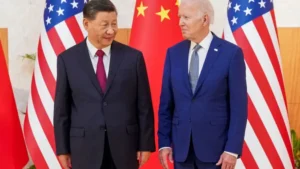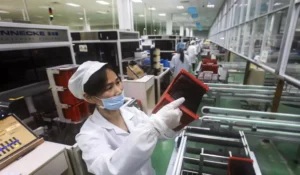On Tuesday, the Biden administration placed increased duties on worth $18 billion Chinese imports, arguing they are required to protect American companies from unfair competition.
Expected to be enforced between 2024-26, President Joe Biden has increased duties on imported Chinese electric vehicles, from 25% to 100%. The import duty on Chinese solar cells will jump from 25% to 50%. Tariffs on select Chinese steel and aluminum imports will rise more than thrice, from 7.5% today to 25%. The White House has announced that Chinese imports of medical needles, syringes, ship-to-shore cranes, rubber medical gloves, some respirators, and face masks will be subject to first-time tariffs.
During a Monday call with reporters, a senior administration official stated, “China is producing at a rate and with a trajectory that’s far more than any plausible estimate of global demand that is going to flood the global market with supply that undercuts our ability to build productive capacity at home and leaves all of us across the world more vulnerable to economic coercion,” said the official.
“The U.S.’s escalation of Section 301 tariffs contradicts President Biden’s commitments not to suppress or contain China’s development and not to seek decoupling from China,” said a representative for the Ministry of Commerce. “The United States should promptly amend its mistakes and rescind the punitive measures against China. China will resolutely safeguard its own interests.”
I just imposed a series of tariffs on goods made in China:
25% on steel and aluminum,
50% on semiconductors,
100% on EVs,
And 50% on solar panels.China is determined to dominate these industries.
I’m determined to ensure America leads the world in them.
— President Biden (@POTUS) May 14, 2024
Signs of Warnings
White House officials have expressed concerns about China’s domestic subsidies for clean energy manufacturing across various agencies. They believe Beijing’s subsidies are causing firms to overproduce low-cost renewable energy items including as solar panels and electric cars, outpacing local demand.
If corporations are unable to sell their surpluses locally, they may wind up dumping them on global markets, making it difficult for other nations’ budding renewable energy sectors to succeed.
Prior to her travel to China in March, when she spoke with Chinese officials on the matter, Treasury Secretary Janet Yellen stated, “China’s overcapacity distorts global prices and production patterns and hurts American firms and workers, as well as firms and workers around the world.”
Chinese government news agency Xinhua criticized Yellen’s claims as “unfounded” and a reflection of Washington’s zero-sum mindset.
Political stakes
According to an administration official, “the Chinese have been investing in their domestic electric vehicle industry [with] the range of unfair practices that are giving them a significant onset, pricing, competitive advantage.” The person said, “We had to make sure we put in the right safeguards given their rapidly growing exports and excess capacity in the sector.”
Beyond basic protectionism, additional variables are likely to be at play. The future success of Biden’s public investments in green energy, semiconductors, and traditional infrastructure is an important aspect of his campaign for reelection in November. Both Biden and the expected Republican nominee, Donald Trump, have foreign policy policies that are strong on China and each has documentation in the Oval Office to back it up.
‘No Impact of Inflationary’
While raising China tariffs helps Biden retain his hawkish posture, researchers caution that higher import levies may have unforeseen implications for the domestic economy and individual consumers.
Goldman Sachs, for example, previously predicted that every percentage point rise in the effective tariff rate would reduce GDP by 0.03%, raise consumer prices by 0.1%, and boost inflation for a year.
The Biden administration has so far maintained that these tariffs will have “no inflationary impact” since they do not apply “across the board” to the economy and only target certain industries, according to a senior administration official on the Monday call.












